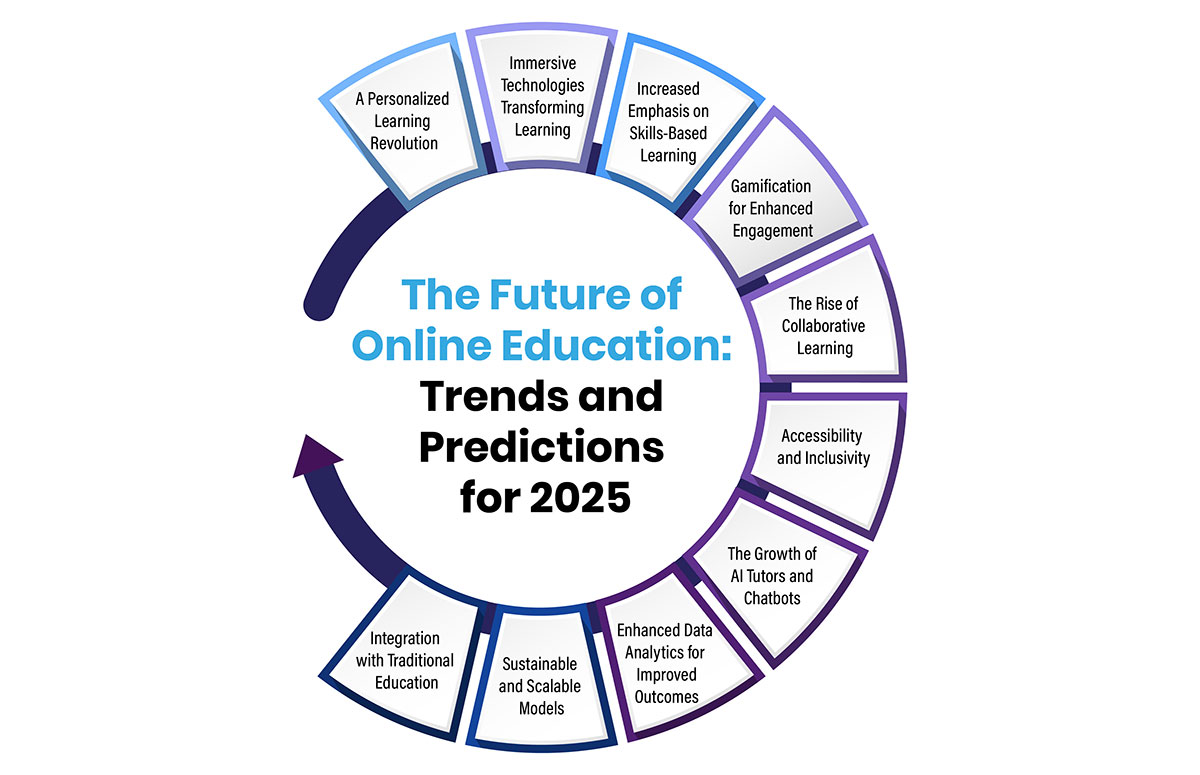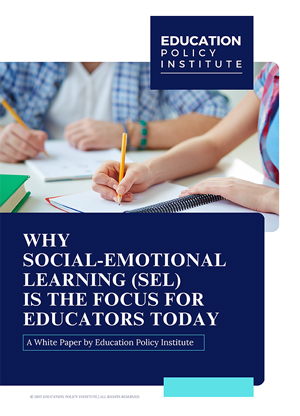As we approach 2025, the education sector stands on the brink of transformative change driven by rapid advancements in technology. From elementary schools to higher education institutions, the integration of digital tools is reshaping learning methods, making them more accessible, interactive, and efficient. The era of skepticism surrounding online education has evolved into one of widespread acceptance, with digital platforms becoming indispensable to global education systems.
Emerging technologies such as artificial intelligence (AI), machine learning (ML), and immersive tools like virtual and augmented reality are redefining traditional learning paradigms. Hybrid learning models that blend in-person and digital teaching approaches are now the preferred choice, catering to the diverse needs of modern learners. Investments in EdTech have skyrocketed, reflecting its critical role in enhancing educational outcomes and bridging gaps in accessibility.
As institutions continue to adapt to these innovations, the future of education promises not only to expand learning opportunities but also to revolutionize how knowledge is delivered, assessed, and utilized. This article delves into the key trends shaping the future of education, highlighting the opportunities and challenges that lie ahead.
The Future of Online Education: Trends and Predictions for 2025
The educational landscape has undergone a seismic shift in the past decade, with online learning emerging as a core component of modern education. As technological advancements continue to reshape traditional learning methods, the future of online education in 2025 promises to be more innovative, inclusive, and immersive than ever.

-
A Personalized Learning Revolution
One of the most significant trends anticipated for 2025 is the widespread adoption of personalized learning. Leveraging Artificial Intelligence (AI) and data analytics, online platforms will increasingly tailor content to meet individual learner needs. AI-driven tools will analyze student performance, identify areas of struggle, and offer customized content, ensuring that every learner progresses at their own pace. Adaptive assessments will further enhance this personalized approach by dynamically adjusting questions based on student responses. -
Immersive Technologies Transforming Learning
Virtual Reality (VR) and Augmented Reality (AR) are set to revolutionize online education by creating immersive learning environments. These technologies allow students to explore historical sites, conduct complex scientific experiments, or experience real-world simulations—all from the comfort of their homes. For example, medical students could practice surgeries in a virtual operating room, while history enthusiasts might walk through ancient civilizations in a virtual tour. -
Increased Emphasis on Skills-Based Learning
The demand for skills-based education is growing as industries prioritize practical expertise over theoretical knowledge. Online education providers are expected to expand their offerings of micro-credentials, certificates, and boot camps focusing on in-demand skills like coding, data analysis, and digital marketing. These programs will equip learners with job-ready skills, bridging the gap between academic learning and industry requirements. -
Gamification for Enhanced Engagement
Gamification, or the incorporation of game-like elements into learning, is another trend gaining traction. Points, badges, leaderboards, and progress bars are being integrated into online courses to make learning engaging and enjoyable. By introducing challenges and rewards, gamified learning not only motivates students but also fosters a deeper connection with the material, improving knowledge retention and application. -
The Rise of Collaborative Learning
Collaboration will play a pivotal role in the evolution of online education. Digital tools and platforms will facilitate group projects, discussions, and peer-to-peer interactions, even in virtual settings. With features like shared workspaces and real-time communication, learners will develop teamwork and problem-solving skills essential for their careers. This collaborative learning approach is particularly beneficial for fostering a sense of community among remote learners. -
Accessibility and Inclusivity
As online education continues to expand, ensuring accessibility and inclusivity will be paramount. Advances in assistive technologies, such as speech-to-text tools, screen readers, and customizable interfaces, will empower learners with disabilities. Additionally, multilingual platforms and culturally sensitive content will cater to a diverse global audience, breaking down geographical and linguistic barriers to education. -
The Growth of AI Tutors and Chatbots
AI-powered tutors and chatbots are expected to become more sophisticated, providing real-time assistance to learners. These tools can answer queries, offer explanations, and guide students through complex topics, enhancing the online learning experience. By reducing the dependency on human instructors for routine queries, AI tutors will allow educators to focus on creating more impactful teaching strategies. -
Enhanced Data Analytics for Improved Outcomes
Data-driven insights will play a critical role in shaping the future of online education. Platforms will leverage analytics to track learner engagement, identify trends, and predict outcomes. Educators can use this data to refine their teaching methods, address challenges promptly, and ensure better academic performance. -
Sustainable and Scalable Models
Sustainability will be a key consideration in the future of online education. Platforms will increasingly adopt energy-efficient technologies to minimize their carbon footprint. Moreover, scalable models that can accommodate large numbers of learners without compromising quality will drive the growth of massive open online courses (MOOCs) and other digital learning initiatives. -
Integration with Traditional Education
Hybrid models that blend online and offline learning will become more common, offering the best of both worlds. While traditional classrooms provide hands-on experiences and face-to-face interactions, online components add flexibility and access to a broader range of resources. This integration will redefine the boundaries of education, making it more versatile and inclusive.
Opportunities and Challenges in the Evolution of Digital Learning
The evolution of digital learning presents a landscape rich with opportunities to enhance education. However, alongside these advancements comes certain challenges, making it essential to balance the benefits with practical solutions. Here are few major opportunities and challenges to take care of:
Opportunities in Digital Education
- 1. Enhanced Access to Learning: Digital education allows students from diverse geographical locations to access quality education, breaking traditional barriers such as time and place constraints. It cultivates inclusivity by catering to learners with disabilities through adaptive technologies.
- 2. Personalized Learning: With data-driven analytics, educators can offer tailored content, addressing individual learning paces and styles. This adaptability leads to better learning outcomes and increased student engagement.
- 3. Professional Development for Teachers: Programs offer training to teachers on integrating technology effectively into their classrooms. These include workshops, online courses, and in-class mentoring.
- 4. Global Collaboration: Digital platforms facilitate collaborative learning across borders, encouraging the exchange of ideas, resources, and cultural understanding.
- 5. Cost Efficiency: The shift to digital education reduces costs associated with physical infrastructure, travel, and operational expenses. Online courses, often priced significantly lower than their in-person counterparts, make quality education accessible to a broader demographic. Institutions also save on expenses like maintaining classrooms and organizing physical events.
Challenges in Digital Education
- 1. Limited Accessibility: Issues such as inadequate internet connectivity, insufficient devices, and outdated hardware remain significant barriers in many regions. This digital divide limits equitable access to education.
- 2. Technical Support Gaps: A lack of skilled personnel for maintaining and troubleshooting educational technology can disrupt learning processes, particularly in under-resourced schools.
- 3. Teacher Resistance and Preparedness: Teachers’ attitudes towards technology, coupled with inadequate training, can hinder its effective integration into the classroom. Confidence and competence in using digital tools are critical for success.
- 4. Privacy and Security Concerns: The increased reliance on digital platforms has heightened the risks of data breaches, raising concerns about student privacy and the ethical use of information.
- 5. Lack of Human Interaction: Digital platforms can sometimes lack the personal touch of traditional classrooms, potentially affecting the development of social skills and collaborative learning experiences. Hybrid models aim to address this but may not fully replicate in-person dynamics.
The Road Ahead
The future of online education in 2025 is remarkably promising, with emerging technologies and innovative methodologies set to transform learning experiences. As we approach this transformative era, the focus must remain on creating equitable, accessible, and engaging educational opportunities for all, ensuring that technology enhances rather than replaces the human touch in education.
By addressing current challenges such as accessibility, privacy, and teacher preparedness, we can develop sustainable systems that bridge divides, create global collaboration, and prioritize lifelong learning. The journey of online education is an ongoing evolution, blending technology, pedagogy, and creativity to empower learners worldwide. Groundbreaking advancements will deliver immersive, adaptive, and personalized experiences that transcend traditional boundaries, unlocking the full potential of digital learning. By embracing innovation and inclusivity, online education promises a future where knowledge is accessible to all, shaping societies to thrive in an ever-evolving digital age.
Latest
Trends blogs
- From Vision to Impact: Closing the Gender Gap in STEM Education
- Automation, Artificial Intelligence, and the Future of Human-Centered Education
- Mid-Career Education in a Changing Labor Market
- The Next Phase of STEM Education: The Role of Artificial Intelligence in Classroom Curricula
Focus blogs
- Research-Driven Education: Strengthening Strategies, Policies, and Classroom Practice
- Professional Certifications for Career Growth: What Students and Young Professionals Need to Know
- Building a High-Impact Center of Excellence: What You Need to Know
- Beyond Graduation: The Importance of Lifelong Learning in Higher Education





